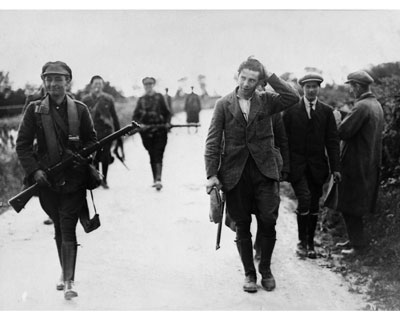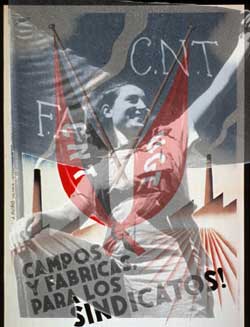Republicanism
Authoritarianism and the early Irish State
 Fin Dwyer looks at the latter years of Ireland’s first post independence government, which having successfully suppressed political opposition and the workers’ movement, went on to “attack women and enforce their moral and ethical values on wider society”. From the clearing of prostitutes from the Monto and the filling of the Magdalene laundries to the institutionalisation of child abuse, he describes how the state’s close association with the Catholic Church played a decisive role in forming attitudes to women and sex that have had a devastating effect on Irish society that can still be felt today.
Fin Dwyer looks at the latter years of Ireland’s first post independence government, which having successfully suppressed political opposition and the workers’ movement, went on to “attack women and enforce their moral and ethical values on wider society”. From the clearing of prostitutes from the Monto and the filling of the Magdalene laundries to the institutionalisation of child abuse, he describes how the state’s close association with the Catholic Church played a decisive role in forming attitudes to women and sex that have had a devastating effect on Irish society that can still be felt today.
Derry and the War on Drugs: An Anarchist View
.jpg) News that the Red Cross, an international humanitarian organisation, have been directly assisting local community workers in the Rosemount area of Derryhas again heightened concerns of a potential “drugs epidemic” developing in the city.
News that the Red Cross, an international humanitarian organisation, have been directly assisting local community workers in the Rosemount area of Derryhas again heightened concerns of a potential “drugs epidemic” developing in the city.
The story first broke over the last few weeks prior to a BBC Spotlight programme investigating the vigilante group Republican Action Against Drugs or RAAD. It revealed that the Red Cross has been working with the Rosemount Resource Centre over the past eight months, believed to be the first time ever the humanitarian group has worked with another organisation in the north.
Torture, Murder & Exclusion: Ireland’s first 10 years of Independence
 The 1916 proclamation, the manifesto of the 1916 rebels, states: “The Republic guarantees religious and civil liberty, equal rights and equal opportunities to all its citizens, and declares its resolve to pursue the happiness and prosperity of the whole nation and of all its parts, cherishing all the children of the nation equally, and oblivious of the differences carefully fostered by an alien government, which have divided a minority from the majority in the past.”
The 1916 proclamation, the manifesto of the 1916 rebels, states: “The Republic guarantees religious and civil liberty, equal rights and equal opportunities to all its citizens, and declares its resolve to pursue the happiness and prosperity of the whole nation and of all its parts, cherishing all the children of the nation equally, and oblivious of the differences carefully fostered by an alien government, which have divided a minority from the majority in the past.”
These noble aspirations would become almost a bible of Irish Republican ideals and within six years, after the end of the War of Independence in 1922, a section of that movement had a chance to implement these ideals. However the society established after the war of independence “The Irish Free State” was a pale shadow of even the most modest interpretation of this document. Civil liberties were almost non existent, citizens were not equal, with women becoming second class while the poor were plunged further into destitution.
The Famine, the Land War & 19th Century Resistance- why is it not happening today
 Over the past three years Ireland has witnessed unprecedented austerity. An aspect that has surprised many people has been the limited and at best sporadic resistance to what has been a savage cut in people’s standards of living. Politicians and the media have on many occasions relished the fact that resistance has been largely ineffectual and isolated, while many left wing activists have been left questioning why most people seem willing to take so much pain.
Over the past three years Ireland has witnessed unprecedented austerity. An aspect that has surprised many people has been the limited and at best sporadic resistance to what has been a savage cut in people’s standards of living. Politicians and the media have on many occasions relished the fact that resistance has been largely ineffectual and isolated, while many left wing activists have been left questioning why most people seem willing to take so much pain.
The republican tradition - a place to build from?
 Ireland has an indigenous revolutionary tradition that successfully mobilized tens if not hundreds of thousands in the struggle for more freedom over the 200 years since 1798. Irish republicanism has always included a radical democratic and leveling element and which continues to provide part of the culture of resistance of the most down trodden sections of the working class. Many believe this makes it the best base to build from, at the fifth Rethinking Revolution meeting Andrew Flood asked if they are right? This article contains the draft text of the talk and the audio recording of the meeting.
Ireland has an indigenous revolutionary tradition that successfully mobilized tens if not hundreds of thousands in the struggle for more freedom over the 200 years since 1798. Irish republicanism has always included a radical democratic and leveling element and which continues to provide part of the culture of resistance of the most down trodden sections of the working class. Many believe this makes it the best base to build from, at the fifth Rethinking Revolution meeting Andrew Flood asked if they are right? This article contains the draft text of the talk and the audio recording of the meeting.
Nationalism, socialism and partition
 The period of Irish history from the 1880's to the 1920's defined and divided politics including socialist politics, on the island for the rest of the century. The most militant workers struggles occurred in the second half of that period, north and south, concentrated in the last five years. This was also the period of the 1916 insurrection in Dublin, the 1918-21 War of Independence, the treaty and partition of Ireland in 1921 and then in the south the bloody Civil War ending in 1923.
The period of Irish history from the 1880's to the 1920's defined and divided politics including socialist politics, on the island for the rest of the century. The most militant workers struggles occurred in the second half of that period, north and south, concentrated in the last five years. This was also the period of the 1916 insurrection in Dublin, the 1918-21 War of Independence, the treaty and partition of Ireland in 1921 and then in the south the bloody Civil War ending in 1923.
The year 1919 saw the greatest demonstration of the potential of Irish workers, north and south to take over the running of society but the events of the following years cemented the division that would do much to end workers militancy. In terms of working class struggle the periods of militancy of northern and southern workers coincide. Yet the working class was divided and these struggles remained almost completely isolated from each other. (Image: UVF training in 1914)
The partition of Ireland
WSM position paper on the partition of Ireland. Last debated and updated at the April 2009 conference.
1916 - Connolly, blood sacrifice and defeating British imperialism
 At 11.30 in the morning of April 24 1916 Bugler William Oman, a member of a syndicalist workers militia the Irish Citizen Army (ICA), sounded the 'fall-in' outside his union headquarters. This was the start of an insurrection in Dublin which was to see around 1,500 armed men and women seize key buildings throughout the city, and to hold these positions against thousands of British Army soldiers for almost a week. In the course of putting down the insurrection, 1351 people were killed or severely wounded and 179 buildings in the city centre were destroyed.(1)
At 11.30 in the morning of April 24 1916 Bugler William Oman, a member of a syndicalist workers militia the Irish Citizen Army (ICA), sounded the 'fall-in' outside his union headquarters. This was the start of an insurrection in Dublin which was to see around 1,500 armed men and women seize key buildings throughout the city, and to hold these positions against thousands of British Army soldiers for almost a week. In the course of putting down the insurrection, 1351 people were killed or severely wounded and 179 buildings in the city centre were destroyed.(1)
Image: Liberty hall after the rising
1916, left republicanism, anarchism and class struggle
 This article is an anarchist analysis of the 1916 insurrection and the war of independence in the context of the struggle for socialism in Ireland and internationally. It concentrates on the 'unknown' but intense class struggle that ran alongside the war of independence and the role republicanism played in the suppression of that struggle. It asks 'what is freedom' and shows how anarchism originated amongst earlier European left republicans as an answer to the limitations of republicanism.
This article is an anarchist analysis of the 1916 insurrection and the war of independence in the context of the struggle for socialism in Ireland and internationally. It concentrates on the 'unknown' but intense class struggle that ran alongside the war of independence and the role republicanism played in the suppression of that struggle. It asks 'what is freedom' and shows how anarchism originated amongst earlier European left republicans as an answer to the limitations of republicanism.
Image: O'Connell street after the insurrection
An anarchist opinion on the Dublin anti-loyalist march riot
 Saturday saw a major riot in Dublin in response to an attempted Loyalist 'Love Ulster' march through the main street of the capital. For three hours hundreds rioted in the city centre, banks and shops were attacked and looted and cars were set on fire. All the political parties including Sinn Fein have condemned the riots but few have analysed what happened. This article first submitted to indymedia.ie suggests the riot shows that "he who sows misery, harvests anger". The author is a WSM member living in Dublin, this is his personal view of events.
Saturday saw a major riot in Dublin in response to an attempted Loyalist 'Love Ulster' march through the main street of the capital. For three hours hundreds rioted in the city centre, banks and shops were attacked and looted and cars were set on fire. All the political parties including Sinn Fein have condemned the riots but few have analysed what happened. This article first submitted to indymedia.ie suggests the riot shows that "he who sows misery, harvests anger". The author is a WSM member living in Dublin, this is his personal view of events.
Like what you're reading?
Find out when we publish more via the
WSM Facebook & WSM Twitter




 Radical health reform, in terms of creating equality and accessibility, and stopping the agenda of...
Radical health reform, in terms of creating equality and accessibility, and stopping the agenda of... Ireland's anarchist paper Workers Solidarity, Issue 101 January - February 2008
Ireland's anarchist paper Workers Solidarity, Issue 101 January - February 2008


Recent comments
13 weeks 4 days ago
15 weeks 6 days ago
16 weeks 2 days ago
16 weeks 6 days ago
18 weeks 3 days ago
2 weeks 6 days ago
21 weeks 1 day ago
21 weeks 2 days ago
21 weeks 5 days ago
24 weeks 5 days ago